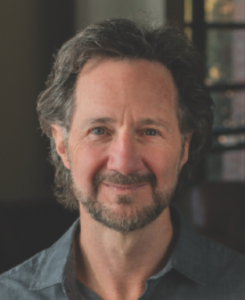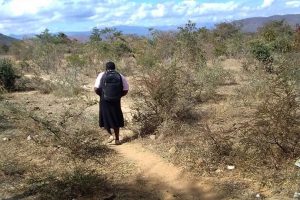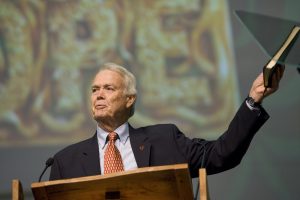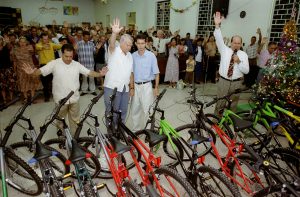
by Steve | Sep 7, 2021 | In the News, Magazine, Magazine Articles, September/October 2021

The Rev. Rob Renfroe, president of Good News
By Rob Renfroe –
Not long ago I spoke via Zoom to the Zimbabwe General Conference delegation. They have asked several persons representing all theological views to talk to them about the future of the United Methodist Church. The man who spoke before I did would classify himself as a “centrist” with progressive leanings. He’s a genuinely good man and has been a good-faith partner in working for the separation that we desperately need. I respect him, his thinking, and his sincerity.
He was asked by one delegate, “What position will traditionalists hold if they do not join the Global Methodist Church but remain in the Post-Separation United Methodist Church (PSUMC)? How will they be treated?”
His answer was, “I cannot imagine a United Methodist Church without traditionalists being respected and put in places of leadership.”
That has been the line we’ve heard from most centrists and many progressives. Nothing will really change. There’s room in the big tent that is the United Methodist Church for all people and all opinions. There’s no real reason for people of good will to separate. And once the hard-core Bible traditionalists (the people that Good News represents) leave, the beliefs of reasonable traditionalists will be honored; and the PSUMC will be one happy, live-and-let-live family.
Again, I believe the man I described above and some others like him are sincere in their views. And I believe they are absolutely mistaken.
We have recently seen a rash of pastors removed from their pulpits by centrist/progressive bishops without consulting with the pastor or their churches – even though the Book of Discipline says they must consult. This has occurred in three different jurisdictions with three different bishops. Why? Because these pastors have made it clear they are traditionalists who support the coming Global Methodist Church.
Already, there have been several annual conferences where “centrist” and “progressive” bishops have removed traditionalist district superintendents and replaced them with others who share the bishop’s nontraditional beliefs. There is now no one close to these bishops who understands or represents traditionalists.
Many annual conferences have gone on record that they will disregard the Book of Discipline’s prohibitions of same-sex marriage and the ordination of practicing gay persons. They are presently ordaining practicing gay persons. Just recently a district in the Illinois Great Rivers Conference certified an openly gay person who performs in drag, Isaac Simmons, as a candidate for ministry. (Certification is the first step in a years-long process toward ordination.) Simmons recently preached at the church where he serves in Bloomington in his drag persona “Miss Penny Cost.” On a YouTube video Miss Penny Cost prays to Mary and refers to God as “Our Lover who art in heaven.” Drag Queen persona aside, a district committee in Illinois Great Rivers felt comfortable recommending for UM ministry a person whose theology cannot possibly be reconciled with authentic Wesleyanism.
Near the time of his crucifixion, Jesus said, “For if people do these things when the tree is green, what will happen when it is dry?” (Luke 23:31). It’s not an easy passage to understand, but the general meaning is that if people will do wrong when there is some kind of restraining influence present, what will they do when that presence is gone?
Up until this time, we traditionalists have been the restraint that has kept progressives from doing all they desire in remaking the UM Church. And still they have mistreated pastors and churches who hold traditional beliefs, embraced a progressive sexual ethic, and walked away from Wesleyan theology. When many of us, if not most of us leave, what will they do and how far will they go in the future?
It’s not hard to imagine because we have worked against their agenda at every General Conference since 1972. Once we leave, UM boards and agencies will likely again become partner organizations with the Religious Coalition for Reproductive Choice, which supports any abortion at any point for any reason. The church is likely to vote to condemn and divest from Israel, the only democracy in the Middle East, as has been proposed time and time again at recent General Conferences. When we are gone, every annual conference will celebrate same-sex marriage and LGBTQ ordination. In fact, there may come an immediate push to redefine marriage, so that it includes more than two persons. In a recent sermon a “centrist” leader said that the vision for the PSUMC will include the affirmation of “trans folks, bi folks, kink folks, poly folk, gender fluid folk and others.” Just to be clear, “poly folk” is a reference to persons who are simultaneously in relationships with several sexual partners. At General Conference 2019, nearly 40 percent of the delegates voted for the Simple Plan, which removed the prohibition against clergy being unfaithful in marriage as a chargeable offense. When traditionalists leave, that 40 percent will probably be at least 60 percent of the PSUMC.
Pastors who do not want to disrupt their churches will tell their people that nothing much will change after the separation. With traditionalists out of the picture, they envision a golden age of peace and understanding will break out within the PSUMC and everyone will be welcome.
But if centrists and progressives do these things when the tree is green, what will happen when it is dry? Embracing the LGBTQ agenda is a justice issue for them. As we have seen in The Episcopal Church, what starts out as permitted soon becomes encouraged and eventually becomes mandatory. “Centrist” pastors will tell their congregations that nothing will change. They may even believe that. But everything will change. There is no energy behind the centrist movement any longer. Those who now dominate meetings held by those with nontraditional beliefs are not the centrists but the progressives. Progressive, woke young clergy do not look up to, and will not be deterred by, middle-aged, primarily white centrists who believe in justice by half-measures. And the progressives will win the day.
Eventually, one can foresee the PSUMC becoming a thoroughly progressive denomination that will not allow for freedom of conscience or practice. And the old centrist guard will not be able to stop the march towards a church that is devoid of traditional beliefs and practices.
It is not surprising that centrist leaders cannot see where the PSUMC is headed. They haven’t wanted to see where the church has been headed for the past 20 years – even though we told them that separation was coming. Consequently, we had to go through several destructive General Conferences and many people have been deeply and unnecessarily hurt, waiting for these leaders to grasp the inevitable. If some in the church now want to trust what these same leaders say they see for the future of the PSUMC after we’re gone – mutual respect, traditionalists being placed in positions of influence and authority, local churches enjoying a real measure of autonomy – they are free to do so. They are also free to take the words of Jesus seriously. “For if people do these things when the tree is green, what will happen when it is dry?”

by Steve | Sep 7, 2021 | Magazine, Magazine Articles, September/October 2021

The Rev. Annamore Kahlari walks home from the Nemanje United Methodist Church, one of five congregations she serves near Makoni Buhera, Zimbabwe. The church is about 15 miles from her home. Photo by Chenayi Kumuterera, UM News.
By Chenayi Kumuterera (UM News) –
Every Sunday, the Rev. Annamore Kahlari awakens before sunrise to pack a bag for her long walk. She is the pastor in charge of Zimbabwe’s Chikore Circuit, Makoni Buhera District.
She journeys about 15 miles each way, carrying a satchel containing a Bible, hymnbook, and bottle of water. Her destination is not just one local church, but five.
Chikore Circuit includes Chikore, where the parsonage is located, Nemanje, Chitsiwa, Manyere and Nyamazira United Methodist churches. “I feel renewed each day,” Kahlari said, “as I walk from local church to local church, conducting my door-to-door visitation to the elderly members and their grandchildren.
“The weather is very hot, especially in summertime, and very cold in winter season; moreover, we do not have electricity,” she continued. Only one of the churches, Chikore, has an actual sanctuary. At the other four churches, the congregation gathers outdoors for worship.
“Rev. Kahlari is such a strong woman of God,” said Sekuru Edward Haparimwe of Nemanje United Methodist Church. Along with visiting members, she conducts funerals and provides counseling. “This pastor is always there for us,” he added, “despite the distance she walks alone or sometimes accompanied by her lay leaders or a pastor-parish committee member.”
Mbuya Loveness Chikotora, 82, described Kahlari as a visionary and loving pastor. “Since the COVID-19 lockdown, Rev. Kahlari has been there for us,” Chikotora said. “She schedules quality time to be with us, the old-aged members in the circuit, teaching, counseling and praying with us.”
Transportation is an ongoing challenge, Kahlari said, noting that travel can take five to six hours each way. “I have a motorbike in my circuit,” Kahlari said, “but I cannot use it because of the terrain of the road, and I have a leg problem.”
The Rev. Diana Matikiti, Makoni Buhera District superintendent, understands. Without a reliable terrain vehicle, she said, the district office also faces a transportation crisis. “Geographically,” Matikiti said, “the district I am superintending is the biggest in Zimbabwe East Annual Conference, which is composed of 29 circuits that are very rural.”
“Chikore Circuit is an agro-based community, living by farming,” Kahlari noted. “Ninety percent of my members are old-aged, who are prayerful, lovely (and) committed to church business.”
She is pleased that the churches are thriving, with an average Sunday worship attendance of 40 adults and 15 children.
“Our pastor is amazing,” commented local lay leader Kasirai Toronga. “Our pastor has taught us to give, which has (encouraged) the Manyere local church to be hardworking.”
On the donated “Munda Wa Tenzi,” which means “God’s land,” the congregation raises crops to help support the church.

Photo: Shutterstock
“Every year,” Toronga said, “we harvest one to two tons of groundnuts (peanuts), and we use the money to buy building materials.”
Before the pandemic, the congregation worshiped in a school classroom. Now, however, “we are no longer using these premises,” Toronga explained. Members struggle through summer heat, winter chill and rain.
“Our pastor always encourages us to support the church and build our own sanctuary,” Toronga said. “So far, we do not have an income-generating project, but if funds permit, we would like to engage as a church in a poultry project and maximize farming in Munda Wa Tenzi.”
Jonathan Gwete, 81, chairs the circuit’s pastor-parish committee. “Recently,” he said, “Rev. Kahlari’s retirement home was destroyed, and building material worth $3,000 (U.S.) was stolen.
“Despite these hard times, our pastor does her work as usual and even taught us to pray always amid all.”
Chenayi Kumuterera is a communicator in Zimbabwe. Distributed by UM News.

by Steve | Sep 3, 2021 | In the News, Perspective E-Newsletter
 Photo Courtesy of Shutterstock. By Thomas Lambrecht –
Labor Day is a holiday in honor of work. Too often, Christians have adopted a secular understanding of work. We view it either as drudgery or as an idol to which we devote all our time and energy. But work is a spiritual endeavor. We are to approach our work as we do everything else in life – under the lordship of Jesus Christ. How would Jesus have us view work? How would Jesus want us to function at work?
The first thing to understand is that work is part of God’s plan for us. When God created us, he gave us work to do. “The Lord God took the man and put him in the Garden of Eden to work it and take care of it” (Genesis 2:15). Humanity is given the gift of cultivating the beautiful world in which we live, improving and developing it according to the creativity God bestowed on us. And we are to do so in a way that cares for and preserves the beauty of God’s world that he has entrusted to us.
“For we are God’s handiwork, created in Christ Jesus to do good works, which God prepared in advance for us to do” (Ephesians 2:10). These “good works” are not just what we traditionally think of as works of mercy or kindness toward others, but includes all the work we do. Everything we do ought to be working for the good of others.
Even Jesus worked, both as a carpenter with his father, and then when he went about his heavenly father’s business. He said, “My Father is always at his work to this very day, and I too am working. … For the works that the Father has given me to finish – the very works that I am doing – testify that the Father has sent me” (John 5:17, 36).
Working is not a result of the Fall of Genesis 3, where humanity rebelled against God, but is an inherent part of being human, as God designed us.
Therefore, we ought to pursue our work, whether as a stay-a-home parent, an executive, a plumber, a teacher, or whatever we do, as a part of God’s calling on our life. The word “vocation” means “calling.” Our work is what God has called us to do with our lives, our vocation. It does not have to relate to church or religious work. Any work that we do can be an expression of God’s calling on our life and a demonstration of our faith.
Further, our work can be an expression of our gifts and personality. Our temperament, talents, and life experience suit us for certain kinds of work, and the way we do our work can also express who we are. This, too, is part of what it means to see work as a vocation.
John Wesley, Methodism’s founder, gives us some practical teaching on a theology of work in his sermon, The Use of Money. He fleshes out some implications of owning Jesus as Lord of our work life.
Governing What Work We Do
The first consideration is to choose work that honors God. Again, that does not limit our work to religious or charitable work. Any work that we do that makes life better for others is a work that honors God.
Wesley reminds us “we may not engage or continue in any sinful trade, any that is contrary to the law of God, or of our country.” In Wesley’s day, that was engaging in smuggling and black market trading that was rampant as a way to avoid paying customs duties on imported goods. In our own day, there are any number of lines of work that are either unethical, illegal, or immoral, which are therefore prohibited to the Christian. As Wesley puts it, anything that we cannot do “without cheating or lying, or conformity to some custom which is not consistent with a good conscience” is off-limits to Christians.
Wesley further teaches that we ought not to engage in work at the expense of our life or our health. The gift of our life is too precious to forfeit for the sake of earning a living. He extends that caution to “any business which necessarily deprives us of proper seasons for food and sleep in such a proportion as our nature requires.” While there are some lines of work that are inherently unhealthy and dangerous to life – coal mining, for example – there are other lines of work that might only be unhealthy for a person with a weak constitution. I could never be a dock worker! So the decision on whether a particular job is too injurious to our health might be an individual decision.
This acknowledgement brings up the special case of people serving in the military or as police or fire fighters. These are dangerous and potentially unhealthy. But they are undertaken specifically to help others in a sacrificial way. Just as Jesus laid down his life for us, there are those who willingly risk life and limb to serve and protect the safety of others. This is a laudable exception to Wesley’s rule.
It should go without saying that any work that harms others is something we ought not pursue. Wesley was against the manufacture and sale of “spirituous liquor” – alcoholic beverages that were more potent than wine or beer. This aversion was because he saw the daily consequences of addiction to cheap gin played out on the streets and communities of England. Perhaps in our time this would refer to the tobacco industry and certainly to the illegal drug trade. A more subtle example for Wesley was doctors who prolonged the illnesses of their patients in order to collect more fees. Payday lenders who charge exorbitant interest today might fit into that category.
At any rate, it is important to assess our career or job choices in light of whether we can engage in them while being consistent with our Christian values. The One who feeds the birds of the air and clothes the flowers of the field will surely provide for us through a type of work that honors him and is beneficial to others.
Governing How We Work
Once having chosen our work and obtained a job, we are called to do our work in a way that glorifies God, as well. It helps if we can see our work as of eternal significance. How is your job beneficial to others? Maybe it is making a product that will make others’ lives better. Maybe it is creating a thing of beauty for others to enjoy. Maybe it is providing a service that helps others live a better life. Finding the transcendent goal in what we are doing, so that we are working for more than just a paycheck, enables us to carry out our work with a sense of purpose and meaning.
Finding that transcendent purpose in our particular work is linked to the idea that we work not for ourselves or for an earthly boss, but for our heavenly Father. “Whatever you do, work at it with all your heart, as working for the Lord, not for human masters, since you know that you will receive an inheritance from the Lord as a reward. It is the Lord Christ you are serving” (Colossians 3:23-24).
The Old Testament Teacher writes, “Whatever your hand finds to do, do it with all your might” (Ecclesiastes 9:10). Our diligence and effort reflect well upon the fact that we are Christians and is part of our personal witness for our faith. Part of that diligence in work is self-improvement. Wesley says, “You should be continually learning from the experience of others or from your own experience, reading, and reflection, to do everything you have to do better today than you did yesterday.”
At the same time, we need to pursue work-life balance. Working seven days a week or being available to our employer 24 hours a day (except in case of emergency) is unhealthy and unsustainable. Our work should not harm our family life or get in the way of our relationships with our spouse or children.
Love and concern for others ought to guide how we treat customers and co-workers. Our contact with them makes them our neighbors, whom we are to love as we love ourselves. This means acting toward them with honesty and integrity, giving them the benefit of the doubt, and striving to be an encouragement rather than a negative influence on their day.
We cannot go wrong in applying the words of Paul, “Love is patient, love is kind. It does not envy, it does not boast, it is not proud. It does not dishonor others, it is not self-seeking, it is not easily angered, it keeps no record of wrongs. … It always protects, always trusts, always hopes, always perseveres” (I Corinthians 13:4-7). Treating others with love in our work environment will not only reflect Christ, it will help change the world.
During college, I attended a church where one of the congregation’s leaders was the manager of the local bookstore. A friend who worked for him told me that, while the man might be a pious leader in the church, he treated his bookstore employees harshly and was stingy with pay. It left a bad taste in my friend’s mouth that a man who claimed to be not only a Christian, but a church leader, did not carry his faith over into his working environment.
Work is the one activity that accounts for the most of our time and effort in life. We have the chance to see our work as an extension of our faith, as a way to make the world a better place, and as a way to witness to others about the goodness of the Lord. This Labor Day, let’s take time to reevaluate if we are doing the right kind of work in the right way to make that vision a reality. |
|
| Thomas Lambrecht is a United Methodist clergyperson and the vice president of Good News. |
|

by Steve | Sep 2, 2021 | Magazine, Magazine Articles, September/October 2021

Loice Namatai Chinyerere (left) and Taziwa Brian Mbwizhu sing during the launch of their album at 7 Arts Avondale, a music venue in Harare, Zimbabwe. Photo by Kudzai Chingwe, UM News.
By Kudzai Chingwe –
In Psalm 40:3, David praises God, who “put a new song in my mouth, a song of praise to our God. Many will see and fear, and put their trust in the Lord.” Like the Psalmist, three Zimbabweans – a child and two young adults with United Methodist roots – use their musical gifts to praise God and to share their faith.
One is Loice Namatai Chinyerere, 25, of Mabvuku United Methodist Church. Born into a clergy family, Namatai uses her melodious gospel voice to tell others about God. “Since 2014,” she said, “I have taken music as part of my life. I am complementing my parents’ ministries by taking gospel music to another level. Through my music, I have been accorded the ambassadorial status by Kubatana.net, a community organization.”
Although she earned a Bachelor of Technology degree in computer science from Harare Institute of Technology, Namatai’s passion pushed her into music. “All this started when I joined the Inner Praise Team of the UM Church,” she said.
In 2016, she began recording her music. “Taziwa Brian Mbwizhu helped me a lot,” she said. “We launched a duet 8-track album, ‘Munoera,’ in 2019, and the financial support was from Denias Zaranyika, a member of the UM Church.”
She said that her objective is “to win souls to Christ through music, and that people be healed, delivered, and uplifted.”
Darlington Marara, Namatai’s music manager, said, “Her music soothes the heart. It gives people hope. I have personally witnessed people getting delivered and giving testimonies about her music. It brings you closer to God.”
Muriwangu Chinyerere, Namatai’s brother, said, “Namatai has chosen to serve full time in the gospel music industry and aims to win many souls to Christ. She started her music career in the UMC, and it was well received. Now it has extended to other denominations and various walks of life. She is very dedicated to music because she genuinely believes in what she sings and in evangelizing through music for the transformation of the world.”
Financing her projects is expensive and challenging. “It costs a lot to produce a song, a video, and to host album launches. In addition, there are few female artists to act as mentors and advisors to upcoming female musicians,” Muriwangu said.
She grew up in a family full of singers who love to sing. The Rev. Brian Chinyerere, Namatai’s father said, “As parents, we did our best to instill life values at an early age. Namatai had church exposure and loved to sing hymns from her tender age. She is committed, strives to accomplish any goals that she sets and is confident. She changes the tone of the church service.”
Taziwa Brian Mbwizhu, 27, who recorded with Namatai, is another upcoming gospel musician. He was inspired to sing at age 9, and at 13, he joined a church choir. “At secondary,” he said, “I formed a vibrant music group, and thereafter, I pursued my music career. I started recording Namatai’s music and then decided to have a collaboration with her, which was a success.” Then Taziwa recorded two albums, “Sezvandiri” and “Musamuramba,” with financial support from Zaranyika.
“Music is incarnated in my blood,” he said. “I feel what I play. I live and breathe music. My vision is to raise other youth with talent and build a music empire in the church,” Taziwa said.
Eight years old. The son of two music teachers, Chashe Chokera, 8, of Chisipiti United Methodist Church did his first Associated Board of the Royal Schools of Music, a London-based examining committee for graded music, at age 5.
Winnie Chokera, Chashe’s mother, said, “At 5, he did grade-1 singing. At 6, he did grade-1 music theory and passed with merit, and at 7, he did grade-1 piano and passed with a distinction.” Chashe plays many instruments: marimba, mbira, piano, and ngoma (drums), and he sings.
“The exposure that he gained from international music tours contributed immensely to nurture his talent,” Winnie Chokera said. “This is in addition to his exposure to music from us.” School music teacher Theresa Covini, said, “Chashe has natural musical talent that he has displayed from this tender age, which is sweet music to every teacher. His discipline and willingness to learn makes him a pleasure to teach.”
“Chashe is incredibly talented,” added Kallah Trewartha, his grade-3 academic class teacher at Springvale House. “He is a well-mannered, polite, and very kind young boy. He has an amazing future ahead of him. I think the Lord has great plans for Chashe.”
The Rev. Daniel Mutidzawanda, the church’s pastor in charge, said, “Chashe is very active in children’s ministry in our church. He is committed and dedicated to the ministry of music. He plays keyboard during church service. He is a humble young boy, and we are proud of him. He has a lot of potential to grow his music talent to great heights.”
“I thank God, who gave me the musical talent,” Chashe said.
Kudzai Chingwe is a communicator for the Zimbabwe East Conference. Distributed by United Methodist News.

by Steve | Sep 2, 2021 | Magazine, Magazine Articles, September/October 2021
Over the years, those of us at Good News grew to consider Eddie Fox a great friend and brother in Christ. He was the most recognizable Methodist personality around the globe for many decades. Fox was passionate about his love for Jesus Christ and had a rocksteady commitment to sharing the good news of the gospel.
Upon hearing of his passing on July 28 at age 83, we remembered his consequential life dedicated to preaching and evangelism.
With gratitude for his vibrant life, we provide the following tribute from the Rev. Dr. Kimberly Reisman, executive director of World Methodist Evangelism. We appreciate her insights.

The Rev. H. Eddie Fox reads the gospel lesson at the 2008 General Conference of The United Methodist Church. Fox, a longtime director
of World Methodist Evangelism, died July 28, 2021. WME seeks to help resource the over 84 million Christ followers in the Methodist
Wesleyan family who worship Jesus Christ in 82 different denominations in 132 different countries. Photo: Mike DuBose, UMNS.
By Kimberly Reisman –
Eddie was a remarkable man whose leadership strengthened and expanded World Methodist Evangelism’s ministry in many significant ways. During his years as World Director, he traveled millions of miles to spread the good news of Jesus Christ and to empower Christians on every inhabited continent in the world to share their faith with authenticity and grace. We stand on the legacy of his firm foundation and continue to faithfully follow the vision he laid out during his 25 years of service to WME.
Eddie came from a long line of Methodists – six generations! His roots grew deep in the soil of a country Methodist church in Sevier County in East Tennessee. It was a point of pride for him that when John Wesley was alive, his family was already Methodist. By the time Eddie was 9 years old, he knew he wanted to follow Jesus. By the time he was 16 he knew he wanted to preach. From the time the church gave him a license to preach at 17, Eddie never stopped proclaiming the good news. God indeed used him in a mighty way.
World Methodist Evangelism’s impact for Christ grew considerably under Eddie’s dynamic leadership. A keen awareness of the importance of meeting the cultural moment drove much of his work. In the years following the dismantling of the Soviet Union, Eddie worked diligently to support emerging and re-emerging churches in Eastern Europe and the Baltics.
In partnership with WME, the Methodist Church in Estonia founded the Baltic Methodist Theological Seminary, and throughout these newly independent countries, new churches and other ministries were planted, and existing churches were strengthened. This movement came to be known as Connecting Congregations and it continues to impact not only churches in Eastern Europe and the Baltics, but churches in Africa and South America and throughout the various denominations of the global Wesleyan Methodist family.

Bishop Ricardo Pereira Diaz of the Methodist Church of Cuba (right) and the Rev. H. Eddie Fox (second from the left) bless bicycles donated to Cuban lay pastors during a 2002 service at J.W.
Branscomb Methodist Church in Holguin, Cuba, by World
Methodist Evangelism. Photo by Mike DuBose, UMNS.
Eddie also recognized the need to provide accessible faith-sharing tools to lay people and to instill the DNA of evangelism in emerging pastoral leaders so they would come to see themselves as mission evangelists for their entire communities. He was instrumental in creating the Faith-Sharing New Testament with the Psalms, which is a resource that has been translated into 40 languages and includes basic answers about questions of faith as well as helpful information about guiding others into a saving relationship with Jesus Christ. 2021 marks the 25th anniversary of this important faith-sharing tool.
Also celebrating its 25th anniversary is The Order of the FLAME (Faithful Leaders as Mission Evangelists), which Eddie launched to equip pastors to do the work of an evangelist and carry out their ministries fully (2 Timothy 4:5). Pastors throughout the Wesleyan Methodist family in North America, Africa, and Ireland have been impacted by the FLAME ethos of holistic evangelism though word and deed, empowered by the Holy Spirit.
Like many others across the globe, Eddie mentored and supported me as a young minister, consistently providing wisdom, guidance, and opportunities for growth. He was committed to building strong relationships and friendships, and because of his joyful spirit and warm heart those friendships came easy and grew deeply. Eddie’s preaching was inspired and inspiring – he knew it mattered. He was tirelessly committed to evangelism, to enabling others to discover a life-giving relationship with Jesus Christ. I thank God he never wavered from that deep commitment.
Please join me in praying for Eddie’s wife, Mary Nell, and the entire family during this time of sorrow and grief. We rejoice that he now rests easy in the arms of his Savior and yet the hole in our hearts is wide and deep. May God provide comfort to us and all those whose lives Eddie touched as we navigate this time of loss.
Kimberly Reisman is the executive director of World Methodist Evangelism, a ministry that brings the global Methodist/Wesleyan family of Christians together around the work of multiplying witnesses for Jesus Christ. Dr. Reisman is an ordained elder in the United Methodist Church and has written numerous books, including The Christ-Centered Woman: Finding Balance in a World of Extremes (2013, Abingdon Press).








